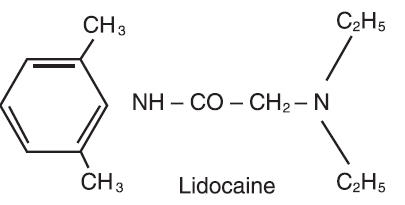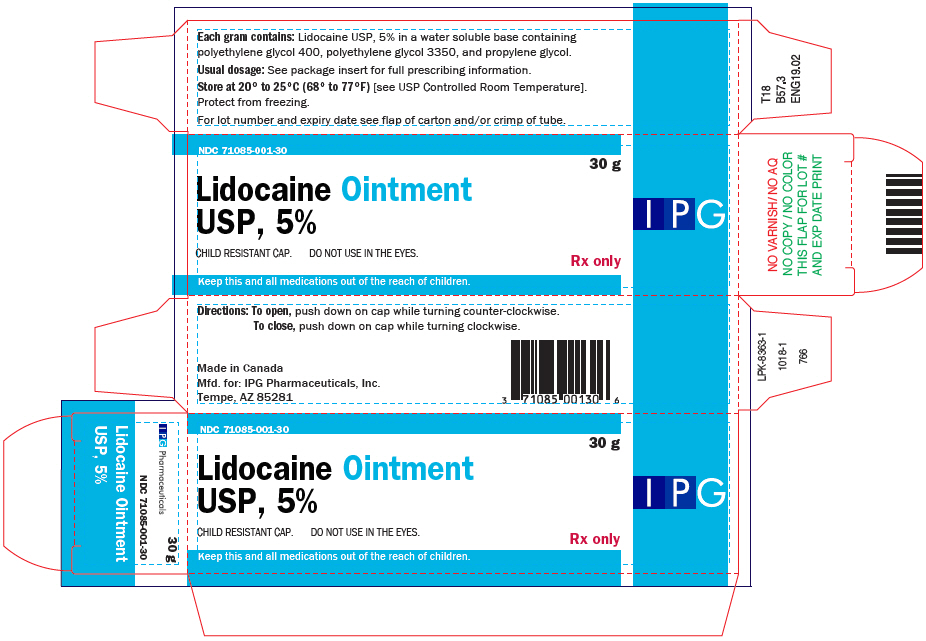Drug Catalog - Product Detail
LIDOCAINE OINTMENT USP 5% 30GM
| NDC | Mfr | Size | Str | Form |
|---|---|---|---|---|
| 71085-0001-30 | IPG PHARMACEUTICALS | 30 | 5% | NA |
PACKAGE FILES


Generic Name
Substance Name
Product Type
Route
Application Number
Description
DESCRIPTION Lidocaine Ointment USP, 5% contains a local anesthetic agent and is administered topically. See INDICATIONS AND USAGE for specific uses. Lidocaine Ointment USP, 5% contains lidocaine, which is chemically designated as acetamide, 2-(diethylamino) -N- (2,6-dimethylphenyl)-, and has the following structural formula: Composition of Lidocaine Ointment USP, 5%: Each gram contains lidocaine USP, 5% in a water soluble base containing polyethylene glycol 400, polyethylene glycol 3350, and propylene glycol. Chemical Structure
How Supplied
HOW SUPPLIED Lidocaine Ointment USP, 5% is available in: 30 g laminate tube with a child resistant cap (NDC 71085-001-30) Store at 20° to 25°C (68° to 77°F) [see USP Controlled Room Temperature]. Protect from freezing.
Indications & Usage
INDICATIONS AND USAGE Lidocaine Ointment USP, 5% is indicated for production of anesthesia of accessible mucous membranes of the oropharynx. It is also useful as an anesthetic lubricant for intubation and for the temporary relief of pain associated with minor burns, including sunburn, abrasions of the skin, and insect bites.
Dosage and Administration
DOSAGE AND ADMINISTRATION When Lidocaine Ointment USP, 5% is used concomitantly with other products containing lidocaine, the total dose contributed by all formulations must be kept in mind. Adult A single application should not exceed 5 g of Lidocaine Ointment USP, 5% containing 250 mg of lidocaine base (equivalent chemically to approximately 300 mg of lidocaine hydrochloride). This is roughly equivalent to squeezing a six (6) inch length of ointment from the tube. In a 70 kg adult this dose equals 3.6 mg/kg (1.6 mg/lb) lidocaine base. No more than one-half tube, approximately 17 to 20 g of ointment or 850 to 1000 mg lidocaine base should be administered in any one day. Although the incidence of adverse effects with Lidocaine Ointment USP, 5% is quite low, caution should be exercised, particularly when employing large amounts, since the incidence of adverse effects is directly proportional to the total dose of local anesthetic agent administered. Dosage for children It is difficult to recommend a maximum dose of any drug for children since this varies as a function of age and weight. For children less than ten years who have a normal lean body mass and a normal lean body development, the maximum dose may be determined by the application of one of the standard pediatric drug formulas (e.g., Clark's rule). For example, in a child of five years weighing 50 lbs., the dose of lidocaine should not exceed 75 to 100 mg when calculated according to Clark's rule. In any case, the maximum amount of lidocaine administered should not exceed 4.5 mg/kg (2.0 mg/lb) of body weight. Administration For medical use, apply topically for adequate control of symptoms. The use of a sterile gauze pad is suggested for application to broken skin tissue. Apply to the tube prior to intubation. In dentistry, apply to previously dried oral mucosa. Subsequent removal of excess saliva with cotton rolls or saliva ejector minimizes dilution of the ointment, permits maximum penetration, and minimizes the possibility of swallowing the topical ointment. For use in connection with the insertion of new dentures, apply to all denture surfaces contacting mucosa. IMPORTANT: Patients should consult a dentist at intervals not exceeding 48 hours throughout the fitting period.
